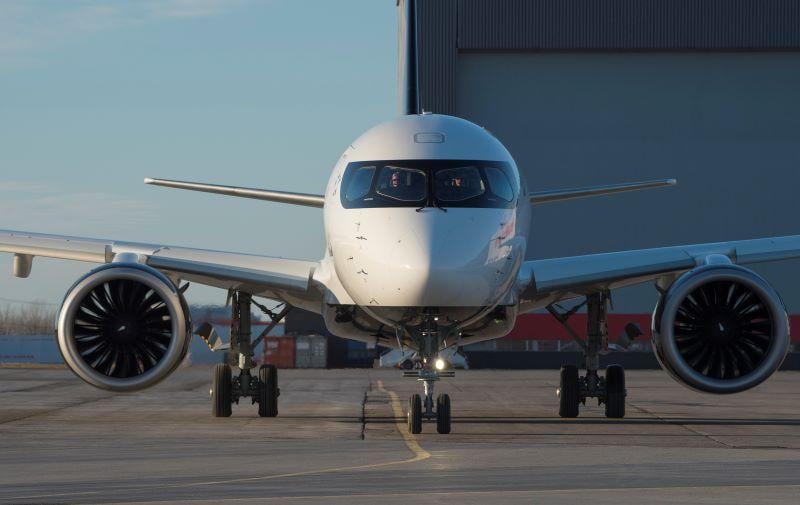
An Airbus A220 is to be flown on blends of sustainable aviation fuel (SAF) up to 100% under an Quebec-backed project involving Airbus Canada, Pratt & Whitney Canada and the SAF+ Consortium.
The companies will provide a total financial contribution toward the CADAQ-100 project of C$17 million ($12.5 million), supported by the Quebec government as part of C$47.5 million in funding announced in April for so-called mobilizing projects for the province’s aerospace industry.
The project will include flight testing of the Pratt & Whitney GTF-powered A220 on 100% SAF. The collaboration will also assess the feasibility of establishing a power-to-liquid e-SAF plant in Quebec to produce up to 100 million liters (26.4 million gal.) of fuel per year by 2028.
Founded in 2019, the SAF+ Consortium in 2021 produced some of the first power-to-liquid synthetic kerosene in North America, in a pilot plant at the ParaChem facility east of Montreal. The e-SAF is produced by using renewable energy to combine captured industrial CO2 and green hydrogen.
“This collaboration will help accelerate our vision to transform Montreal into a North American sustainable aviation hub, something which we have always known could only be achieved as a cross-industry effort,” says Jean Paquin, president and CEO of SAF+.
“While the A220 already offers the smallest carbon footprint for any single-aisle aircraft flying today, achieving readiness to operate with 100% SAF will help ensure the A220’s sustainability and competitiveness well into the future,” says Benoît Schultz, president and CEO of Airbus Canada.
Pratt & Whitney ground-tested its GTF Advantage engine on 100% SAF in March 2022 and, with Embraer, flew a GTF-powered E195-E2 on neat SAF in June 2022. Having flown an A350 on 100% SAF in 2021, Airbus in March flew an A321neo on neat SAF, but with the competing CFM Leap-1A engines.
CADAQ-100 is one of four mobilizing projects announced in April to help Quebec’s aerospace industry develop technologies for future aircraft and sustainable mobility. Managed by the SA2GE Coalition for Greener Aircraft, the projects involve eight companies and a total of CS94.9 million in government and industry funding.
Under the Aquarel 3 project, Flying Whales Quebec and Thales Canada are developing control systems for the LCA60T heavylift cargo airship. CMC Electronics and Bell Textron Canada are developing systems for autonomous hybrid-electric logistics missions. Bombardier and Thales Canada are developing a modular airborne systems testbed for new aircraft control architectures.
